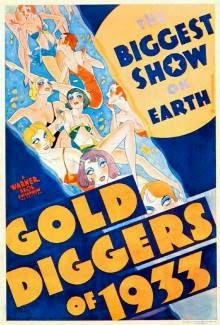
Directed By: Mervyn LeRoy
Starring: Warren William, Joan Blondell, Aline MacMahon
Tag line: "The Biggest Show On Earth!"
Trivia: One of the neon-outlined violins used in the Shadow Waltz number is on display in the Smithsonian's National Museum of American History in Washington, DC
42nd Street may be the best of Busby Berkeley’s musicals, but my favorite will always be Gold Diggers of 1933. With its intricate dance routines and some truly funny moments, Gold Diggers of 1933 is fun with a capital “F”.
When his latest show is shut down by the creditors, Broadway director Barney Hopkins (Ned Sparks) heads back to the drawing board and before long dreams up a production he’s convinced will run for years. The problem is: he needs money to put it on. Enter songwriter Brad Roberts (Dick Powell), who, along with being hired by Hopkins to write the show’s music, coughs up the cash to produce it, on the condition that his girlfriend Polly Parker (Ruby Keeler) is cast as the lead. Hopkins quickly agrees, and also signs up Polly’s roommates Carol (Joan Blondell) and Trixie (Aline MacMahon), as well as plenty of other hopefuls who badly need the work. A talented singer, Brad is courted by Hopkins to play one of the lead roles, but says he’s unable to do so. At first, he doesn’t say why he can’t perform, but soon his reasons are revealed: his name is actually Robert Bradford, of the Boston Bradfords, a wealthy family that would surely not approve of his being mixed up in show business. It turns out Brad was right; when his older brother Lawrence (Warren William) catches wind of his involvement in Hopkins’ latest venture, he travels to New York with Fanuel Peabody (Guy Kibbee), the Bradford’s family lawyer, to talk Brad into dropping out. What’s more, they object to his being romantically linked to a common showgirl, and decide to offer Polly a large sum of money to break things off with Brad. But when they mistake Carol for Polly, it leads to a series of mishaps that will ultimately teach both Lawrence and Peabody a thing or two about Broadway girls.
Gold Diggers of 1933 starts off strong with a rousing rendition of “We’re in the Money”, performed by Fay Fortune (Ginger Rogers), who even sings one verse in Pig Latin! It’s an elaborate production number, but is nowhere near as extravagant as “Pettin’ in the Park”, which features everything from policemen on roller skates to pretty girls walking in the rain. Towards the end of the film, we’re treated to “The Shadow Waltz” (the highlight of which is a sequence involving dozens of violins that glow in the dark), as well as “Remember My Forgotten Man”, a melancholy ditty set against the backdrop of the Great Depression. As good as the first three tunes are, “Remember My Forgotten Man” is hands down the movie’s best musical number.
Its songs aside, Gold Diggers of 1933 is also a very funny movie. Believing Carol is Polly, Lawrence Bradford wines and dines her, hoping to make her fall in love with him so that she’ll leave Brad alone. Aided by Trixie, who sets to work seducing the lawyer Fanuel Peabody (she gives him the nickname “Fanny”), Carol goes on pretending that she’s Polly, and forces Lawrence to spend big bucks on her (a sequence set in the girl’s apartment, where they convince both Lawrence and Peabody to buy them expensive new hats, is pretty damn hilarious). It isn’t long before the two stuffed shirts fall for the girls’ charms, and watching them get raked over the coals by the conniving ladies is a definite highpoint of what I believe is Busby Berkeley’s shining cinematic accomplishment. Unlike most musicals of this era, Gold Diggers of 1933 is every bit as entertaining without the music as it is with it.
